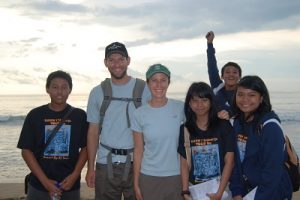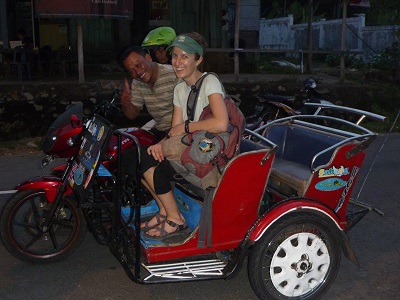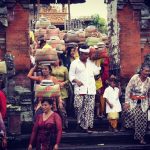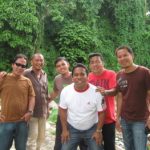To my right a woman in pink track shorts excuses herself to reach across and grab the peanut butter. A mother wheels by with a small girl strapped in the front basket of the trolly toward cereal. Countless other people have walked pass me occasionally making eye contact. However none of them have asked to have their picture taken with me, asked me where I am from, where am I going or waved enthusiastically with the widest grinning smile declaring “Hello Mister!”
I am back in a country where the majority of people look like me. I blend in. No one comes running out of a shop just because they want to greet me, know my name and tell me theirs.
I had just returned to Australia, the country where I was living at the time, after a seven week trip primarily throughout Sumatra, Indonesia. For the first time in seven weeks I have the ability to walk around a town unnoticed, drive myself places, cook for myself and enjoy the simple of task of boiling my own water for a cup of tea.
Being our first trip to an Asian country my husband and I had many unknowns leading up to our departure. What would the toilets be like? Would we be able to eat any lettuce for the next seven weeks? Would they have dial-up internet in more remote places so we could write mum and dad? Would we return with all our belongings? Would we get worms?For all the unpleasant reasons Indonesia might make the news, I found it to be a country teetering between first and third world advances full of bright, beaming and smiling people.
Indonesians love tourists, particularly Westerners, as my birth country is the United States. They are fascinated with our music, fancy cars, houses, food and lifestyle. In general Indonesians love tourist because wherever you originate from, you have made the journey to their home town where they have probably spent their entire lives. They would love to welcome you, know your name and ask where you are from.
I saw first-hand how this direct questioning could cause some visitors to feel uncomfortable, as if they were being hassled or their personal space was being invaded. Having a complete stranger, come rushing up to you waving their arms and proclaiming “Hello Mister!” regardless of your gender is most likely not a normal, daily occurrence in the home countries of most of us visitors. Yet to embracing these interactions is where the beauty of the Indonesian people lay as was shown to me on a random walk to a cave in the jungle.
While in Indonesia Chris and I were spending a few days in Bukit Lawang, about three hours West of Medan heading inland and up into the jungle. Meaning “The Hill which is the Gateway to the Moutain,” Bukit Lawang is nestled at the edge of Gunung Leuser National Park. The park operates a rehabilitation center reintroducing orangutans back into the wild. The rangers feed orangutans who are not yet completely living on their own and visitors are allowed to watch. Straddling both sides of the Bahorok River, the small village offers a range of simple bungalows and rooms. Family run cafes perched over the water offer local fare of nasi gorang (rice with vegetables or chicken) or gado gago (peanut sauce dish served over rice) with sweet tea in a glass bottle. On weekends, locals flock to Bukit Lawang to rent inner tubes and endlessly float up and down the river as family’s picnic on the banks.One of the attractions for visitors is to walk through a rubber plantation to Bat Cave. As my husband and I were exiting the cave we passed two Indonesian men sitting there. All day they sit there to collect an entrance fee of 50 cents from each tourist who ventures into the cave. Around them was a small cloth neatly laid out with necklaces and bracelets made by their mothers, wives and daughters. They kept encouraging us over and over again to sit by them. I didn’t want to sit. I presumed I was going to feel pressured and guilty for not buying a necklace for the sum of a dollar. We kept politely trying to move on and they kept persisting we sit with them. Yet when I observed the situation further I noticed each of them holding tattered and well-worn dictionaries and English phrase books. We sat down.
Their names were Amed and John, and every day they sit there together waiting for a hopeful five tourist to make the trek to the cave. While sitting there they teach English to themselves. They want to learn English because it not only gives them more opportunity to earn an income, but to simply talk freely with visitors from all over the world whom are passing through their village. They want to ask all of us questions about why we are here, what is life like in our home country, what do we think of their village, what we eat for a normal dinner or to learn more about our families.
Sitting on crooked logs in benches under towering lush jungle trees we took turns passing the dictionaries back and forth to converse for well over an hour. We learned about Amed’s three children and that they enjoy their family dog. We learned that sometimes Amed is able to pick up work on the rubber plantations. John told us he hopes to buy a motorcycle. Eventually darkness was setting in and we had to walk back to the village. We each said good bye to each other in our native languages as they love to use the American expression of “See you!”Back in the comfort of my first world life I often think back on Amed and John sitting under those trees. For them I hope at least five tourists went to the cave that day. I think back to all the Indonesians I meet carrying tattered dictionaries in their back pockets. Ronnie who drove us to the airport in his tuk tuk, Johan who lead us through the jungle, Oman who cooked us amazing meals and Jack who lost his entire family in the tsunami and served us at a cafe just so he can practice his English. It was through listening to all of these stories I came to appreciate and understand that if running up to a tourist yelling “Hello Mister!” meant that it might lead to even two minute conversation so I could practice my English and improve my life, I’d be running down the road after every tourist I saw too.












your story sounds amazing! nice to read anything about my country that wrote by other citizens. =)
Thanks Paramita. We had such a wonderful time in Indonesia. It is such a large and diverse country. We plan to go many more times. Thanks for the comment!
Nice Piece Tiffany – I’ve had similar experiences with people being so interested and it always makes me feel good.
Thanks Mike, glad you’ve also been able to have a positive experience similar to this. I still think back and I am so thankful I did not miss this opportunity.
Nice story. You were really off the beaten path. So, did you end up buying a necklace for a dollar? It sounds like a great trip.
And really… a Woolworth’s, I miss Woolworth’s. Makes me think of all those little turtles I had as a kid (my oldest brother never outgrew that).
We never did buy a necklace, but we did happily pay the entrance fee. They were lovely to talk to and the setting was surreal. In Australia we always call Woolworth’s “Woolies”. I’d say I’m just running to Woolies for some milk. Thanks for the comment!
What a great story! The parts of a vacation, travel experience, or exploration of a new place always seem to be the most memorable for all the little moments that are totally unexpected and impossible to plan. Taking the time to learn and really understand one’s culture creates for memories that will be treasured closest to the heart.
Thanks Laura! I agree – those little moments are often the most memorable.
Great story. Glad you had a chance to talk to those guys and experience that. Thanks for sharing.
Travelling can bring so many pleasant surprises. Thanks for the comment!
just to clarify -there is no actual rehabilitation centre in Bukit lawang – that is in Bukit Tiga Puluh national park ,South Sumatra and is closed to tourists -foreign or otherwise.Tthe oranguatans in BL are the remains of the original rehab project which was in BL until about 7 years ago. They are a released population that are semi wild and fed daily to attract tourists. There are no new oranguatans going in there and haven’t been for a number of years.